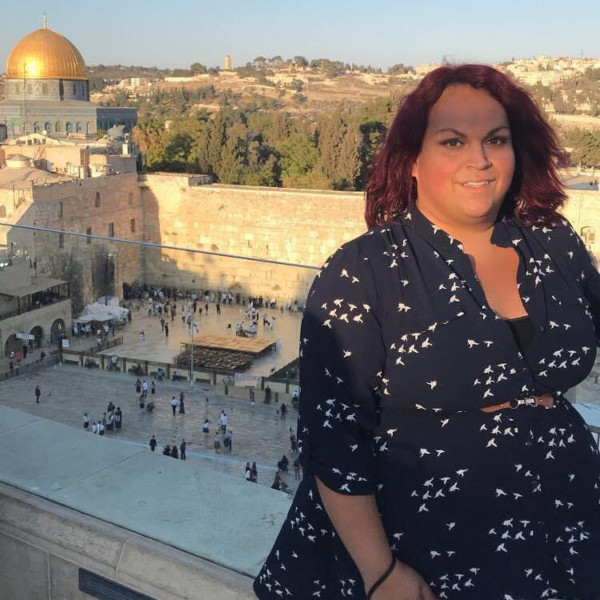Interviews with Olim
Each month, we interview an oleh or olah for our newsletter.
We invite you to read the stories of LGBTQ+ people who have made Israel their home.
“My year in Israel has been transformative”
Interview date: November 2019
Q. Where were you born and where did you grow up?
A. Following the typical migration of the American Jew, I was born in Brooklyn and moved to New Jersey in my early years! My parents decided to leave New York after they had me, the youngest and third child in the family. I grew up on the periphery of Trenton, New Jersey’s capital and stayed in the area even after college. Hamilton, the town I lived in, was not exactly the center of Jewish life in New Jersey. Still, my mother was adamant that we kept our Jewish traditions and values. Although we did not attend a shul, we celebrated the holidays and our Jewish identities played a very active role in our family life.
Q. At what age did you come out? And how did it go?
A. I had several coming outs! The first time I came out to my parents was as a teenager. At this time, I identified myself as a gay man and presented this way for several years. Although I lived this way for many years, I knew that I would ultimately come out again when I was ready to live truthfully as a trans woman.
My parents have always been accepting and supportive of me, but it took a while for them to adjust to me being trans. Like many parents, my parents struggled to understand what being transgender meant and it changed the dynamic of our relationship. It took several months for us to adjust and for them to get used to Alex. This was stressful for all of us, but in retrospect I realize how hard of a position many parents of trans people have.
For me, I kept my identity as a secret from my friends and family and used identifying as a gay man as a form of protection from the rejection that I thought I would face. After coming out, it was almost like I had to re-introduce myself to all the people in my life — coming out to family, students, friends and even the guys at the pizza spot by my house. When you come out as a trans person, it can be difficult and sometimes embarrassing to have to reintroduce yourself to the people you see in your daily life. Imagine people that have known you for years suddenly not recognizing you or being confused when you show up and no longer look like the person they remember.
Coming out is a constant process and I’m glad that I had a mostly supportive field of friends and family. I did lose friends when I came out, but I think that is to be expected. I am glad to have a loving family – one that believes in unconditional love.
Q. Were you involved at all in the LGBT community back home?
A. Before making Aliyah, I was heavily involved in the LGBTQ+ community. During my college years, I was president of PRISM, one of the most active college LGBTQ+ organizations based at the College of New Jersey. PRISM, founded in 1976, creates programming and spaces for queer students to feel safe and celebrated. As president, my goal was to create events which reflected the diversity of identities within the college while promoting a fun and social environment for members of the community to feel at home. Through PRISM, I hosted an annual charity drag show between 2012-2017 with the purpose of raising money for homeless LGBTQ youth and HIV/AIDS research. During this time, I was crowned as Miss Gay New Jersey (2015) and would represent my community through several other titles.
Outside of the college, I co-founded a monthly performer showcase in the city of Trenton to give a stage to dancers, drag performers, singers and other queer artists. Divas Revue still runs today under the management of my co-founder and is known as a great community hangout to catch a entertaining show. In addition to performances, each showcase is followed by a mini-ball – a time for performers from the ballroom circuit to show off their talent and listen to the music that is essential to queer black and Latina identity in the United States.
Additionally, I worked as a volunteer mentor for an LGBTQ+ organization in Princeton, HiTops. HiTops allowed me to mesh my love of teaching and LGBTQ+ advocacy by speaking at Gay Straight Alliance forums where hundreds of high school students gathered to learn about queer issues. Through performance and non-profit circles, I was able to spend a great deal of time advocating for and learning with my community.
Q. What is your involvement (if any) in the LGBT community in Israel?
A. My involvement in the LGBT community looks very different than my past involvement. In the past, I was typically in queer spaces and surrounded by members of the community during my advocacy work. In Israel, I find myself more and more in non-LGBTQ+ spaces at the request of straight and cisgender people to educate them on LGBTQ+ topics. Last summer, I was featured on (TV channel) Keshet 12 and interviewed regarding my job as an elementary school teacher. Although I expected more questions about being trans and teaching, it was mentioned rather passively in my interview that I am trans which surprised me.
I think one of the things I value about Israel is that my work is valued regardless of my identity as a trans woman. Still, I enjoy the opportunities that have been coming up to educate people on the topics of queer identity and gender politics. I would seek to get more involved in Israel’s LGBT community, but for now it seems that I have been swimming upstream as someone who does not know enough Hebrew to engage with many of the groups or their resources. I am currently working on a resource packet for queer and trans healthcare in Israel for English-speaking Olim.
Q. How long since you made Aliyah?
A. Although I lived in Ramle for ten months for a MASA program, I technically made Aliyah four months ago.
Q. Did you move here on your own or with family/friends/significant other?
A. I moved to Israel on my own but I’m thankful to have some friends all over the country.
Q. Why did you make Aliyah?
A. I made Aliyah because of a combination of Zionism and angst. I had just finished my exams for my teaching certification in New Jersey where I had previously been working as the academic director of a non-profit summer camp and as a case worker during the school year. Although I loved my job, I was in need of a change of pace and a new adventure that satisfied some of the deeper seeded goals that I had to return to Israel. Finding MASA Israel Teaching Fellows, I decided to make a temporary move to Israel and did not expect it to be permanent! However, a few months into my year of teaching I began to understand that my desire to be in Israel was growing. I decided to stay after my year of teaching-volunteering.
Q. How is it going so far?
A. Moving to another country on your own can be tough. I remember breaking down one day, six months in, when I was very sick (on a public bus in Ramle) in tears because I am so used to having family around me when I am not feeling well. Being on your own teaches you that you alone are accountable for your self-care and wellbeing. Cry on the bus, but wipe those tears away and don’t miss your transfer. My year in Israel has been transformative, it has made me feel more connected to my identity as a Jew and more invested in the future of Israel. However, it is not an easy transition to go from the United States to living in Israel on your own.
Q. What do you do in terms of work?
A. I currently work as an English Lecturer at the College of Management in Rishon LeZion. Additionally, I teach high school English in Rishon and have just had my first article published in Ha’Aretz
Q. How is your Ivrit?
A. It’s good enough to order food, go shopping, not get lost and instruct my classroom! But don’t ask me to do anything else!
Q. What has been your biggest challenge so far?
A. Finding a balance between work and personal life is a struggle for me here. I am not accustomed to getting work messages at 10pm and I have kept myself very busy between school, work, volunteering and learning in informal spaces. I guess the issue here is that there are not enough hours in the day!
Q. How do you perceive the Israeli LGBT community?
A. My only perception has been of the Israeli LGBT Olim community. The LGBT Olim have been so welcoming and loving since I moved to Israel. Many of the people I meet at Olim events have opened doors for me and welcomed me into the spaces they have created for themselves in Israel. I have not had too much interaction with non-Olim LGBT groups since coming to Israel.
Q. How is being LGBT in Israel different to back home?
A. Personally, I feel like I get to just do my job and live my life in Israel and that is something I didn’t feel in the United States. Even living in a very progressive state, I found that people tend to be more progressive on paper than in practice. I experienced many scenarios where I was turned away from jobs I was overqualified for after coming out and never had that experience prior to coming out as trans. In Israel, my employers and coworkers have always welcomed me with open arms and a promise to defend me should there every be an instance of intolerance, which there hasn’t been.
Q. If you were making aliyah now, would you do anything differently?
A.I would likely plan my paperwork way in advance. You are not a real Israeli until you have spent several days of your life waiting in government offices lost in piles of paperwork!
Alex

Our Newsletter
Sign up if you would like to receive a monthly email listing events of interest to LGBT English-speakers in Israel, an interview with an oleh/olah and other useful information.
Want to be interviewed?
Complete the form below and we will get back to you.
Our Newsletter
Sign up if you would like to receive a monthly email listing events of interest to LGBT English-speakers in Israel, an interview with an oleh/olah and other useful information.
Want to be interviewed?
Complete the form below and we will get back to you.


